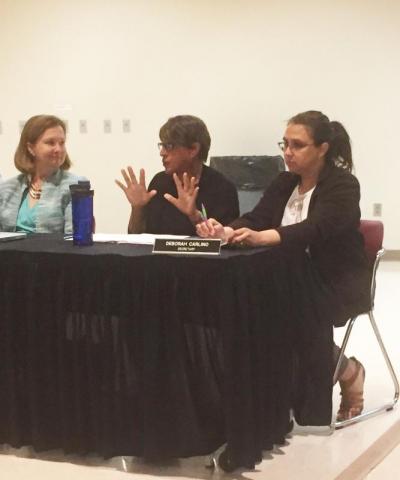Community members ask school committee to address racism
Racism has been going on in the Old Rochester Regional school system for years and continues to this day, two black community members said at a May 22 Old Rochester Regional School Committee meeting.
Danielle Lopes, who teaches in Fairhaven, told a tale about her son being threatened by another student to the point where he called her from the bathroom, too terrified to even leave and talk to the teacher. When she spoke with the Principal, the administrator was quick to turn the discussion to why her son was using a phone in school, instead of addressing the racial issue.
Barbara Sullivan, former long-time director of the Wareham Boys and Girls Club, also appeared to address the issue, speaking about experiences that her children and grandchildren had told her about. She read at length from a paper that her granddaughter, Jendell Texiera, had written in the eighth grade.
“As a young black woman I have dealt with racism not just outside the school, but in it,” Texiera wrote.
Texiera wrote that she has been inappropriately singled out as an example in a discussion of slavery, when the teacher could have picked any one of the white students, and was disappointed that only one week was dedicated to black history in February.
Texiera continued that “there is not one black teacher,” in school, and that she would feel uncomfortable bringing some of her concerns to a white teacher.
The student wrote that much was made of gay marriage being legalized, but the country and community have not made similar strides in combatting racism. “Does being black in America need to be legalized too?” she asked in her essay.
John Pyers also served on the committee but could not appear before the school committee because of an illness. He wrote that black students were criticized for standing up for Quirino doCanto in February after the Wareham athlete was allegedly called the n-word and spit on.
Lopes talked about an activity she went through at a conference that asked one team to do the same task as two other groups, but with fewer materials and more restrictions.
“We didn’t all start in the same spot to get where we needed,” Lopes said, likening the experience to discrimination.
Ultimately she believes that change “needs to come from the heart. We need to touch their hearts. No one can empathize, but sympathize would be a good start.”
Sullivan and Lopes said that the school had brought in training from the Anti-Defamation League, but that training did not adequately cover racism.
They called for more teacher training, with Lopes noting that “ not all teachers are guilty, but all teachers would benefit.” The two also called for stricter substitute training, pointing out that some of the racial incidents had occurred with substitutes who might not have gotten the same training as teachers.
They also called for support services to help black students deal with situations they find difficult, and schools to be better about educating students and staff about white privilege.
School committee members thanked the two women for an eye-opening presentation, and asked about action items for the next meeting, to ensure what they had just heard does not get lost. School Committee Chair Cary Humphrey also said that he had set up a meeting with the advocates to further discuss the issue.













